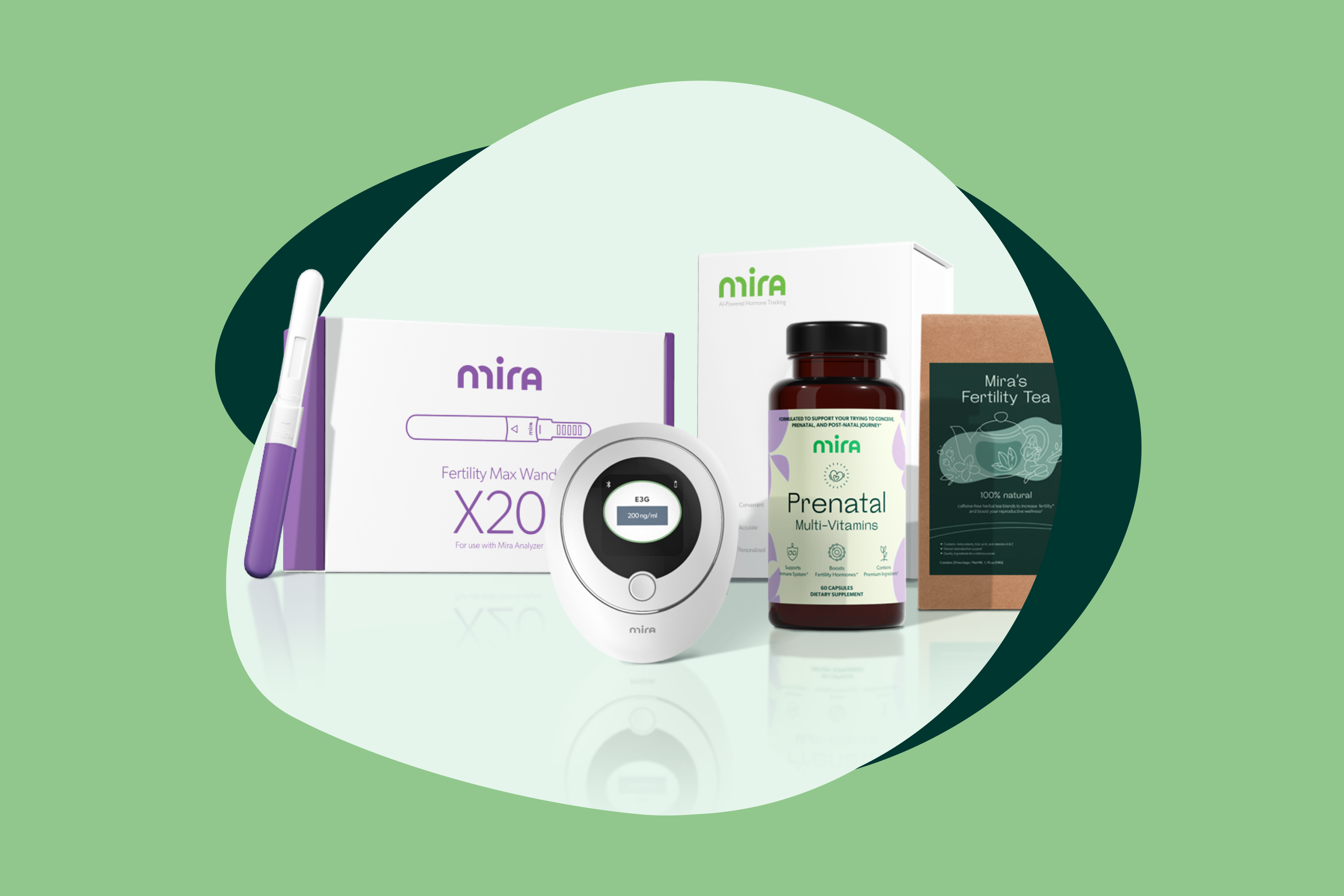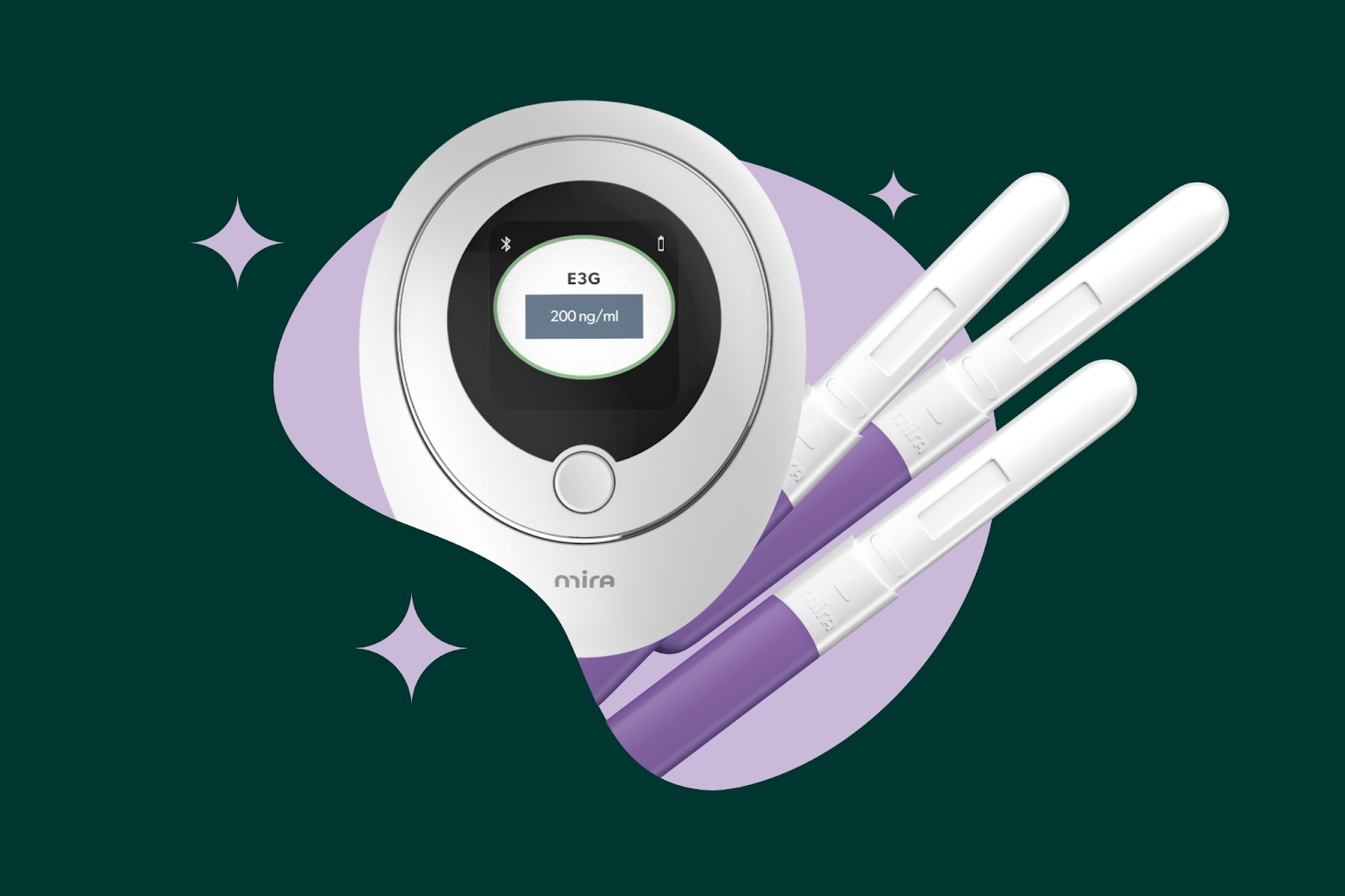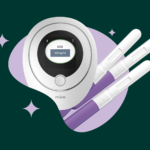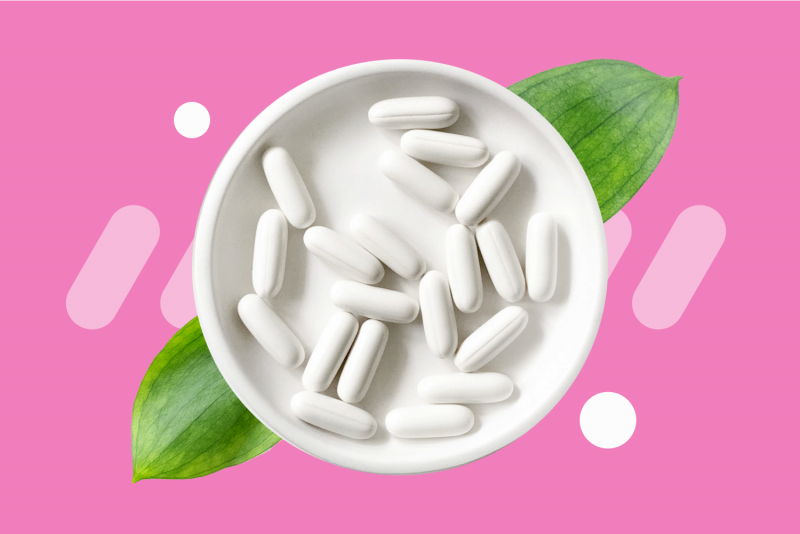Best Fertility Products to Buy in 2025: Top Solutions for Every Step of Your Journey

From the often unsolicited advice from friends and family to the never-ending TTC (trying to conceive) trends on social media, it can be hard to tell which products and strategies will actually help you get pregnant this year.
At Mira, we want you to be able to cut through the noise.
To help, we’ve created a list of the best fertility products to buy in 2025 — from tried and true essentials to the latest supplements and fertility tracking technologies.
Laying the Groundwork to Maximize Fertility
Start Tracking Your Cycle
First things first: you need to start tracking your cycle. Why? Because there are only around six days per cycle where you are most fertile. This window of time is called your ‘fertile window’, and it encompasses:
- The three to four days leading up to ovulation
- The day of ovulation
- The day after ovulation
Everyone’s fertile window is unique, and it’s considered normal to ovulate anytime between cycle days 10 and 21.
The best way to keep track of your cycle dates is with a cycle tracking app. Most apps can estimate your fertile window for you. This allows you to focus on having sex at the right time when your body is able to conceive.
Our pick for basic cycle tracking? The Mira App (it’s free!).
Check Your Hormone Levels
It’s also a good idea to get your hormones checked to assess your overall fertility. This step is especially critical if you are:
- Over the age of 35
- Have a history of hormone imbalance and/or irregular cycles
- Have been diagnosed with hormonal conditions, such as polycystic ovary syndrome (PCOS)
By having a basic understanding of your hormone health and fertility, you’ll know how to tweak your TTC strategy to maximize your chances of conception.
You can always ask your doctor if it’s possible to run fertility bloodwork at your next checkup. If you’d like your results sooner, there are also a number of finger-prick blood tests available that you can take at home. Our pick for at-home fertility testing? The Mira Panorama Fertility Lab Test — it measures five key fertility hormones; providing insight into your ovarian reserve, thyroid function, menstrual cycle, and more!
Maintain a Fertility-Friendly Diet
Diet also plays a huge role in the TTC process. It not only helps to improve your chances of getting pregnant in the first place, but it also reduces the risk of early pregnancy complications.
Foods and nutrients to focus on while TTC include:
- Folic acid (vitamin B9) or folate – found in leafy green vegetables, nuts, and bananas
- Fiber – found in beans, lentils, nuts, seeds, whole grains, and berries
- Calcium – found in dairy products, fortified plant-based milks, and leafy green vegetables
- Omega-3 fatty acids – found in fatty fish, leafy green vegetables, flax seeds, and nuts
- Protein – found in lean meats, beans, lentils, and nuts
It’s also important to limit your exposure to substances that may be harmful in early pregnancy. This includes:
- Alcohol
- Tobacco and tobacco alternatives (such as e-cigarettes)
- Caffeine
It’s not always possible to get all the nutrients you need from diet alone. For an additional boost of nutrients, consider incorporating fertility tea into your routine. Our pick? Mira’s own Fertility Tea — it’s packed with essential ingredients to help balance hormones and boost fertility.
Minimize Stress
High stress levels can hinder your ability to get pregnant. This is backed by research associating stress with lower chances of conception.
Exercise works wonders for reducing stress. It pumps your body full of happy hormones and endorphins, and it helps you get restful sleep at night.
Other ways to reduce stress include:
- Engaging in creative hobbies
- Saying ‘no’ to new responsibilities
- Watching a film or TV show (without doom scrolling!)
- Reading a book
- Taking a bubble bath or hot shower
Guided meditations and breathing exercises can also help you wind down when you’re feeling a bit frazzled. Our recommendation for this? Mira’s Fertility Meditation Playlist.
Choosing the Right Fertility Vitamins and Supplements
At a bare minimum, it’s recommended to start taking a prenatal vitamin at least three months before starting the TTC process. Prenatal vitamins are formulated with specific ingredients and dosages to set a pregnancy up for success.
Even if you have the most perfectly optimized pre-pregnancy diet, you still need to take a prenatal vitamin. This is because prenatal vitamins are clinically proven to:
- Reduce the risk of pregnancy complications and birth defects
- Support neural tube development
- Support the mother’s immune system
- Keep hormone levels in balance
In addition to prenatal vitamins, additional supplements such as coenzyme (CoQ10), inositol, and progesterone may help to improve fertility outcomes in certain cases.

Key Ingredients to Look For
Here’s an overview of the key ingredients often found in fertility pills for women:
- Folic Acid (synthetic form of folate): Critical for neural tube development in early pregnancy and reducing the risk of birth defects
- Vitamin C: Boosts the immune system and promotes healthy ovulation
- Vitamin D: Contributes to healthy hormone balance
- Omega-3: Supports uterine health and hormone balance
- CoQ10: Supports mitochondrial functioning on the cellular level and improves egg quality
- Inositol: Promotes cycle regularity and ovulation, especially among PCOS patients
Other key ingredients to look for include:
- Choline
- Copper
- Iodine
- Iron
- Magnesium
- Manganese
- Selenium
- Zinc
If you are undergoing IVF, your doctor may also recommend progesterone supplements to support implantation.
The Best Fertility Supplements for Women While TTC
So what should you look for when shopping online or at the pharmacy? The following table can help.
| Fertility Supplements for Women: What to Expect | |||||
| Key Ingredients | Benefits | Who Needs It? | Average Price per Month | Dosage | |
| Prenatal Multi-Vitamins | Folic acid (folate), iron, vitamin D, vitamin C, iron, choline, iodine, magnesium, selenium, and copper | Promotes early neural tube development, reduces the risk of birth defects, supports a healthy immune system, and balances hormones | Anyone who could become pregnant, especially those TTC | $10-$40 | Recommended minimum daily dosage of folic acid (folate) is 600 mcg. Recommended minimum daily dosage of iron is 27 mg. Dosage of other ingredients may vary depending on the brand. |
| Folic Acid Supplements | Folic acid | Promotes early neural tube development and reduces the risk of birth defects | Anyone who could become pregnant, especially those TTC | $5-$20 | Recommended minimum dosage of folic acid (folate) is 600 mcg. |
| PCOS Supplements | Inositol (Myo Inositol and D-Chiro Inositol) | Promotes cycle regularity and ovulation | PCOS patients | $10-$30 | Recommended Myo and D-Chiro inositol ratio of 40:1 |
| Progesterone Supplements | Progesterone | Supports the uterine lining and implantation process | IVF patients | Varies | Varies |
Our picks for the best fertility supplements and prenatal vitamins to get pregnant? Mira’s own Prenatal Multi-Vitamins and PCOS Supplements.
If you have any questions about the ingredients, dosages, side effects, or potential interactions your fertility supplements may have with your existing medication, speak with your doctor. They can provide you with the very best advice for your individual situation.
Tracking Your Fertile Window
Remember, you only have around six days each cycle where it’s possible to conceive. Tracking this fertile window is absolutely essential for planning a pregnancy.
If you already use a basic cycle-tracking app to calculate your fertile window, great!
However, to improve accuracy, it’s worth leveraging other fertility tracking tools and techniques. This will help you conceive as efficiently as possible. Here are three of the most common techniques and the products that help.
Basal Body Temperature Tracking
BBT is your body’s temperature when it is completely at rest. For most women, BBT rises by approximately 0.4-0.5F after ovulation. If you regularly track BBT, you’ll be able to spot this slight increase. This allows you to confirm when ovulation occurred. Over time, you’ll be able to spot patterns and more accurately anticipate ovulation.
BBT must be measured with a BBT thermometer that can measure temperature up to two decimal places. Our pick to assist with this? The Mira BBT Thermometer.
Cervical Mucus Tracking
For most women, the body produces more cervical mucus in the days leading up to ovulation and during ovulation. It’s nature’s way of letting you know that your body is ready to conceive.
If you are TTC, try to pay attention to how your cervical mucus changes throughout your cycle. When it increases in volume and starts to look and feel like raw egg whites, you’ll know that ovulation is near. For more advanced cycle tracking, it’s recommended to regularly record your cervical mucus characteristics in your cycle tracking app or diary.
Hormone Tracking
Your hormones are hard at work behind the scenes, orchestrating each process of the menstrual cycle. By tracking certain fertility hormones regularly, you can anticipate your fertile window and day of ovulation with up to 99% accuracy.
The traditional way to do this is with an ovulation predictor kit (OPK), which is designed to detect the surge in luteinizing hormone (LH) in urine ahead of ovulation. However, OPKs don’t always work for everyone, especially individuals with irregular cycles and/or PCOS.
Thankfully, technology has vastly improved since the introduction of the first OPK in 1989.
It’s now possible to measure your exact hormone levels in urine at home with more advanced hormone monitoring systems. Our pick for this will always be the Mira Hormone Monitor and Wands, which can measure and track up to four key fertility hormones in urine, including:
- luteinizing hormone (LH) – to predict your ovulation day
- Estrone-3-glucuronide (E3G) – to predict your six-day fertile window
- Pregnanediol glucuronide (PdG) – to confirm ovulation
- Follicle-stimulating hormone (FSH) – to understand your overall fertility health
When charted in the Mira App, it’s possible to see your personalized hormone curves, cycle patterns, and fertile window. This is a game changer for individuals who:
- Want some clarity into what’s going on with their cycle
- Want to conceive as fast and as efficiently as possible
- Can’t use OPKs due to irregular cycles and/or PCOS
To learn more about how Mira can help you track your cycle while TTC, visit How Mira Works.

A little extra support from an expert can go a long way
Book an online consultation with one of our Hormone Health Coaches.
Schedule NowA Mini-Guide to Selecting the Fertility Products That Fit You Best
Get Clear On What You Need
Everyone’s body and circumstances are different. Some of us have no idea how to plan a pregnancy. Some of us have irregular cycles. Some of us thought pregnancy would just ‘happen’ but it hasn’t yet. All of these scenarios are okay!
Before you purchase any fertility products, it’s important to first reflect on your current situation and fertility goals. A great place to start is by having a conversation with your doctor to discuss your medical situation and strategies for success.
It’s also a good idea to do some research on the TTC process. Our pick to help with this? Mira’s Get Pregnant Online Course.
Choose High-Quality Products
Your pregnancy is important, and it’s important to only choose high-quality products that will support you. When evaluating fertility products, consider asking the following questions:
- Is this product backed by any research studies?
- Do experts recommend these products?
- What do the reviews say?
- Is it tested and certified by a third party?
- How much information is available about the brand?
- Are the credentials of the team clear and visible?
You can find a lot of this information online. You can also ask for advice from your healthcare provider, friends, and family members who have planned pregnancies before.
Don’t Be Afraid to Seek Support
The TTC process can be frustrating and emotional. It’s okay if you need some extra support. We always recommend looking around for online or local TTC support groups. Just feeling like you’re not alone can be a huge relief.
If you need support with the day-to-day practicalities of planning a pregnancy, we recommend reaching out to a fertility expert. Our pick for this will always be Mira’s own Hormone Health Clinic for Fertility. Our expert hormone health coaches are practical, empathetic, and available to provide guidance on all aspects of fertility.
Know When to Speak With Your Doctor
There are certain cases where you need to speak with your doctor for specialized guidance. If you are TTC and you:
- Have an underlying health condition
- Have irregular cycles and/or
- Have a history of miscarriages
You should make an appointment with your doctor. You should also speak with your doctor if you have been TTC without success for at least 12 months (if under the age of 35) or six months (if over the age of 35).
Final Thoughts
Looking ahead, we’d like to leave you with the following four key takeaways:
- If you want to get pregnant this year, start taking a prenatal vitamin asap. If you have PCOS, it’s also worth exploring PCOS supplements.
- Start tracking your menstrual cycle and fertile window. The more you know about your body, the easier it will be to pinpoint ovulation.
- Strive to maintain a healthy lifestyle with minimal stress. This will help to improve your chances of conception.
- Don’t be afraid to advocate for yourself and seek additional support when you need it. Your reproductive goals matter!
Yes, the TTC process can be overwhelming — but you’re not alone. There are a whole host of tools and support available to support.
Frequently Asked Questions
Do female fertility supplements really work?
Prenatal vitamins are clinically proven to support early fetal development and reduce the risk of birth defects. They can also help balance hormones in some cases. Other fertility supplements, such as inositol, CoQ10, and progesterone may help to improve fertility outcomes in some cases.
What are the best vitamins to get pregnant fast?
No single vitamin or supplement can promise a quick conception. The best way to maximize your chances of conception is to maintain a healthy pre-pregnancy diet, take a prenatal vitamin, and have sex during your fertile window.
How long should I take fertility supplements?
Prenatal vitamins can be taken before pregnancy, during pregnancy, and after pregnancy. If you plan to take additional supplements, consult your doctor for further guidance on dosage.
Are fertility supplements effective for women over 40?
Yes. Fertility supplements and prenatal vitamins are effective for women over the age of 40.
What are some foods that increase fertility?
Foods that help to increase fertility include:
Berries
Beans and lentils
Dairy products
Fatty fish
Leafy green vegetables
Nuts and seeds
Whole grains
How long do fertility supplements take to work?
For the best results, it’s recommended to start taking prenatal vitamins at least three months before you start to plan a pregnancy. Inositol supplements also take around three months before you will start to see results.
What are the best fertility products for PCOS?
In addition to prenatal vitamins, PCOS patients should also consider inositol supplements. For advanced cycle tracking, digital hormone trackers like Mira can also be helpful.
What are the best fertility products for women over 35?
In addition to taking a regular prenatal multivitamin, individuals over 35 should consider getting their hormones checked with a product like the Mira Panorama Fertility Lab Test. This test provides insight into reproductive health and functioning so you can create a practical TTC strategy.
What are the best fertility products for women over 40?
In addition to taking a regular prenatal multivitamin, individuals over 40 should consider getting their hormones checked with a product like the Mira Panorama Fertility Lab Test. This test provides insight into reproductive health and functioning so you can create a practical TTC strategy.
Mira’s Editorial Process
All content produced by Mira meets stringent editorial standards, ensuring excellence and accuracy in language and medical precision. Every piece undergoes thorough fact-checking and review by qualified professionals. Check out our full editorial process to learn more.










